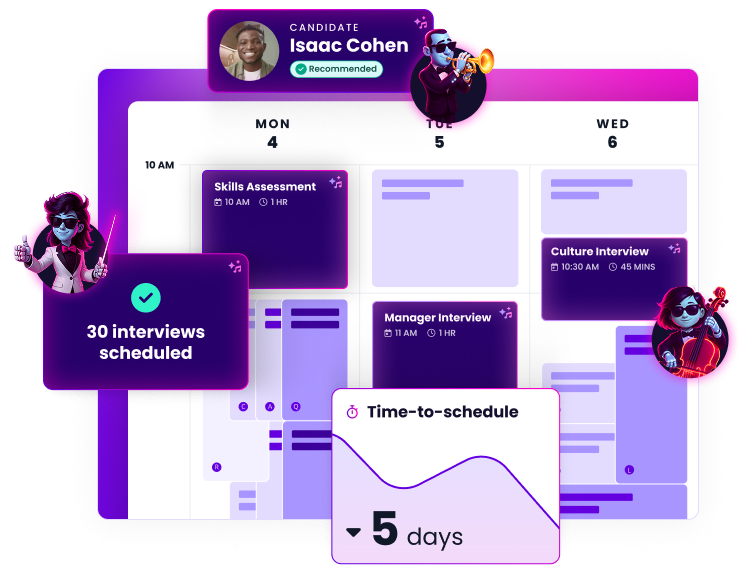Table of Contents
In today’s competitive hiring landscape, interview scheduling tools have become essential for keeping recruiting teams fast, efficient, and candidate-centric. Whether you’re a small business managing a handful of roles or a global enterprise coordinating thousands of interviews a month, choosing the right platform can make or break your hiring process.
Here’s a look at the top five interview scheduling platforms leading the way in 2026 — and how they compare.
1. GoodTime — the leader in complex interview scheduling automation
What it does:
GoodTime is the market leader in automating even the most complex interview scheduling workflows. From multi-day panels to global coordination across time zones, GoodTime handles it all — seamlessly syncing people, calendars, and data to keep hiring fast, human, and efficient.
Unique advantages:
Powered by GoodTime’s digital workforce of AI agents, the platform goes far beyond simple booking links. These intelligent agents proactively coordinate interviews, auto-replace interviewers as needed, detect bottlenecks, and surface real-time recommendations. Every action is transparent and configurable, giving recruiters full control while cutting scheduling time by up to 90%.
GoodTime is also proven to drive ROI in enterprise hiring, boasting the “Best Estimated ROI” according to G2, and with an established customer list that includes Databricks, Aon, HubSpot, and HelloFresh.
Best for:
Enterprise talent acquisition teams managing complex or high-volume hiring across multiple departments or regions.

Pros:
- Automates even multi-day and panel interviews
- AI agents act autonomously to fix issues before they cause delays
- Seamless integration with major ATSs (Workday, Greenhouse, Lever, and more)
- Built for both corporate and high-volume hiring
- Enterprise-grade security, including ISO/IEC 42001, world’s first international standard for Artificial Intelligence Management Systems (AIMS)
Cons:
- More feature-rich (and priced accordingly) than lightweight SMB tools
- May be more advanced than small teams need
2. Zoho Recruit — for SMBs that want basic scheduling inside an ATS
What it does: An all-in-one ATS with built-in interview scheduling, candidate tracking, and job distribution — convenient for small to midsize teams that prefer a single vendor.
Unique advantages:
Its simplicity and strong integration with other Zoho tools make it ideal for growing teams that need a straightforward system without the overhead of enterprise-scale automation.
- Part of the Zoho suite — handy if you already use Zoho apps
- Simple self-scheduling for straightforward, simple interviews
Best for:
Small businesses or early-stage teams running mostly 1:1 or simple panel interviews.
Pros
- Affordable, consolidated toolset
- Easy setup and day-to-day use
Cons
- Scheduling features are better for simple flows than complex, multi-day loops
- Automation and insights are lighter by design
3. Breezy HR — for small startups that prioritize ease and speed
What it does: A user-friendly ATS with interview scheduling, Kanban pipelines, and collaboration tools that help lean teams move quickly. It supports basic self-scheduling links and calendar integrations through Google and Outlook.
Unique advantages:
Breezy’s drag-and-drop pipelines and interview scorecards make it great for teams that want a visually collaborative hiring process.
- Intuitive candidate pipelines with quick scheduling actions
- Self-service links work well for common scenarios
Best for:
Startups and SMBs that prioritize simplicity over deep scheduling automation.
Pros
- Fast to learn and run
- Solid basics for coordinating 1:1s and small panels
Cons
- Lacks advanced automation and analytics
- Limited for high-volume or global scheduling
4. Interviewer.AI — for teams that want screening + basic scheduling
What it does: Combines AI-assisted screening and video assessments with basic interview booking — useful for triage before interviews begin.
Unique advantages:
It’s designed for companies that want to save recruiter time by automating early-stage candidate assessments.
- Automated candidate screening and structured video responses
- Time savings up front for high applicant volumes
Best for:
Small teams that need help narrowing the funnel, then booking straightforward interviews.
Pros
- Accelerates first-round screening
- Streamlines handoff into initial interviews
Cons
- Scheduling features are basic
- Less suitable for complex or multi-day interview coordination
5. Doodle — best for ad-hoc, lightweight coordination
What it does: A classic and somewhat free meeting-polling and booking tool that makes it easy to find a time with individuals or small groups.
Unique advantages:
Its simple interface and low cost make it perfect for organizations with minimal hiring volume that need a quick, no-frills scheduling solution.
- Extremely simple for ad-hoc availability collection
- Works well outside a hiring context for general meetings
Best for:
Freelancers, consultants, or very small businesses managing a handful of interviews.
Pros
- Familiar, quick, and inexpensive
- Great for one-off time finding
Cons
- Not tailored to recruiting workflows or ATS ecosystems
- Lacks automation for complex interview orchestration
Why GoodTime leads in interview scheduling
If you hire at scale, complexity is where time is lost — and candidate experience suffers. GoodTime leads by fully automating complex scheduling while keeping people in control, and by backing talent teams with proactive AI agents that keep interviews moving — from first touch to final loop. That’s why enterprise TA teams choose it when simpler tools can’t keep up.




